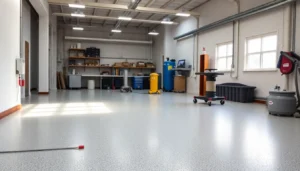
Understanding Forklift Rental: Overview and Benefits
In today’s fast-paced industrial landscape, efficient material handling plays a crucial role in productivity and operational success. Among the essential equipment in warehouses, construction sites, factories, and logistics centers is the forklift—a versatile machine designed to lift, move, and place heavy loads with precision. As businesses seek flexible, cost-effective solutions for their material handling needs, forklift rental emerges as a strategic choice, providing access to top-tier forklifts without the burdens of ownership. This comprehensive guide explores everything you need to know about forklift rental, from its fundamental advantages to selecting the right equipment for your industry, ensuring your operations remain smooth, compliant, and efficient.
What Is Forklift Rental and Why It Matters
Forklift rental involves leasing forklifts from specialized providers for a designated period—ranging from days to several years—allowing businesses to meet fluctuating demands without the hefty capital investment associated with outright purchase. This flexibility is especially vital for seasonal peaks, temporary projects, or businesses testing new operations or locations.
In the UK, a growing number of companies are recognizing the strategic advantages of leasing forklifts for their operations. Rental providers offer a wide array of models tailored to diverse industries, ensuring that businesses can access the right machinery for their specific needs. Moreover, rental agreements often include maintenance, support, and compliance management, offering a hassle-free experience and reducing operational risks.
To better understand the scope and accessibility, visit Forklift rental and explore options tailored to your business size and sector.
Advantages Over Buying: Cost, Flexibility, and Maintenance
Cost-Effectiveness and Cash Flow Management
Purchasing forklifts can require significant upfront capital, often stretching budgets and tying up resources. Conversely, rental offers predictable, manageable expenses with flexible leasing terms, freeing up capital for other operational needs. Rental fees typically include maintenance, reducing unforeseen costs and simplifying budgeting.
Flexibility and Scalability
Rental agreements allow businesses to adapt equipment fleets swiftly in response to changing workload demands. During peak seasons, additional forklifts can be leased temporarily; during quieter periods, fleets can be scaled back without the complexities of selling assets. This agility ensures optimal resource utilization.
Maintenance and Support
Rental providers often incorporate maintenance, servicing, and operator training into their packages, minimizing downtime and operational disruptions. This proactive approach ensures equipment reliability and safety compliance, allowing businesses to focus on core operations rather than equipment management.
Reduced Depreciation and Obsolescence Risks
Ownership entails depreciation costs and the risk of equipment becoming outdated. Leasing sidesteps these issues, providing access to the latest models and technology, which enhances safety and efficiency.
Key Factors to Consider When Choosing a Forklift Rental Service
Reputation and Reliability
Partnering with reputable rental providers, such as those offering comprehensive support and adhering to safety standards, is essential. Research customer reviews, industry ratings, and certifications to gauge reliability and service quality.
Range of Equipment and Industry Specialization
Select a provider that offers a diverse fleet tailored to your industry—be it warehousing, construction, manufacturing, or agriculture. Specialized equipment such as reach trucks, rough terrain forklifts, or counterbalance models can make a significant difference.
Support, Maintenance, and Training Services
Ensure the provider supplies ongoing support, scheduled maintenance, and operator training. Comprehensive services reduce operational downtime and promote safety adherence.
Pricing Transparency and Contract Flexibility
Compare quotes thoroughly, noting any hidden costs. Flexible rental terms and adaptable contracts allow you to modify or extend rentals based on evolving project needs.
Compliance with Safety Standards
UK regulations mandate rigorous safety standards for lifting equipment. Confirm that your rental provider complies with all legal requirements and that proper documentation is provided.
Types of Forklifts Available for Rent
Electric, Diesel, and LPG Forklifts Explained
The choice of forklift power source profoundly impacts operational efficiency, environmental compliance, and suitability for your working environment.
- Electric forklifts: Zero emissions, quiet operation, ideal for indoor use, warehouses, and enclosed spaces.
- Diesel forklifts: High power, robust for heavy-duty outdoor applications such as construction sites or long-distance loading.
- LPG forklifts: Versatile, cleaner than diesel, suitable for both indoor and outdoor use, with quick refueling capabilities.
Choosing the Right Forklift for Your Industry
Different industries have unique requirements:
- Warehousing: Electric forklifts for indoor stacking and narrow aisle operations.
- Construction: Rough terrain forklifts with high ground clearance and strong lifting capacities.
- Manufacturing: Versatile forklifts with attachments for handling specialized loads.
Specialized Equipment for Heavy Loads and Tight Spaces
Beyond standard forklifts, consider specialized equipment such as:
- Reach trucks: For narrow aisles and high stacking.
- Telehandlers: For lifting heavy loads to elevated work sites.
- Side loaders: For handling long, awkward materials like pipes or timber.
How to Optimize Your Forklift Rental Experience
Assessment of Business Needs and Load Requirements
Begin by analyzing your operational demands. Consider load weights, load dimensions, frequency of use, and environment. Accurate assessment ensures you select the appropriate forklift type and capacity, preventing over- or under-utilization.
Rental Duration: Short-Term vs. Long-Term Solutions
Decide whether short-term (days or weeks) or long-term (months or years) rentals suit your project timeline. Many providers offer flexible options, with long-term contracts often including discounted rates and maintenance packages.
Planning for Delivery, Operation, and Pickup
Coordinate logistics with the rental provider to ensure timely delivery and pickup. Prepare your site for equipment arrival, including space allocation, safety zones, and operator training. Adequate planning minimizes delays and maximizes equipment utilization.
Cost Insights and Budgeting for Forklift Rental
Pricing Structures and Hidden Costs
Rental costs vary based on forklift type, duration, and supplier policies. Typical weekly rentals can start from £65+VAT, with long-term agreements offering discounts. Be vigilant about hidden costs such as delivery charges, insurance, fuel, and maintenance fees.
Comparing Quotes: Ensuring Value and Quality
Request detailed quotes from multiple providers, focusing on total cost of ownership, included services, and contractual terms. Opt for reputable suppliers offering transparent pricing and comprehensive support.
Cost-Effective Maintenance and Support Packages
Leverage maintenance-inclusive packages to reduce operational disruptions. Regular servicing prolongs equipment lifespan and maintains safety standards, ultimately saving costs over time.
Regulatory Compliance and Safety Standards
Understanding UK Safety Regulations for Lifting Equipment
The UK mandates rigorous safety regulations under agencies like the Health and Safety Executive (HSE). Compliance includes routine inspections, safety certifications, and proper operator training. Non-compliance can lead to legal repercussions and accidents.
Rental Provider Responsibilities and Your Role
Providers are responsible for ensuring equipment safety and maintenance. As a renter, your role involves verifying certification, ensuring proper storage, and adhering to operational guidelines.
Training and Certification for Operators
Proper training is crucial for safe forklift operation. Many rental services include operator training, emphasizing safety protocols, load limits, and emergency procedures. Certified operators reduce accident risk and improve operational efficiency.







